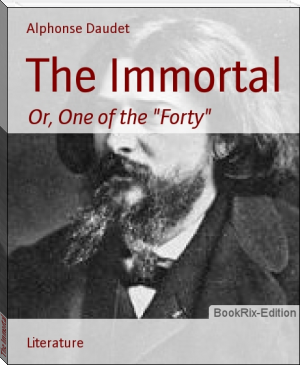Jack by Alphonse Daudet (web ebook reader txt) 📖

- Author: Alphonse Daudet
Book online «Jack by Alphonse Daudet (web ebook reader txt) 📖». Author Alphonse Daudet
The table equipage, the imposing effect produced by Augustin, in short, all the luxurious details of the house, appealed to his senses, and D'Argenton, without flattering the countess as openly as did Moronval; yet succeeded in doing so in a more subtile manner, by thawing under her influence to a very marked extent.
He was an interminable talker, and submitted with a very bad grace to any interruption. He was arbitrary and egotistical, and rang the changes on the _I_ and the _my_ for a whole evening, without allowing any one else to speak.
Unhappily, to be a good listener is a quality far above natures like that of the countess; and the dinner was characterized by some unfortunate incidents. D'Argenton was particularly fond of repeating the replies he had made to the various editors and theatrical managers who had declined his articles, and refused to print his prose or his verse. His mots on these occasions had been clever and caustic; but with Madame de Barancy he was never able to reach that point, preceded as it must necessarily be with lengthy explanations. At the critical moment Ida would invariably interrupt him,--always, to be sure, with some thought for his comfort.
"A little more of this ice, M. d'Argenton, I beg of you."
"Not any, madame," the poet would answer with a frown, and continue, "Then I said to him--"
"I am afraid you do not like it," urged the lady.
"It is excellent, madame,--and I said these cruel words--"
Another interruption from Ida; who, later, when she saw her poet in a fit of the sulks, wondered what she had done to displease him. Two or three times during dinner she was quite ready to weep, but did her best to hide her feelings by urging all the delicacies of her table upon M. and Madame Moronval. Dinner over, and the guests established in the well warmed and lighted salon, the principal fancied he saw his way clear, and said suddenly, in a half indifferent tone, to the countess,--
"I have thought much of our little matter of business. It will cost less than I fancied."
"Indeed!" she answered absently,
"If, madame, you would accord to me a few moments of your attention--"
But madame was occupied in looking at her poet, who was walking up and down the salon silent and preoccupied.
"Of what can he be thinking?" she said to herself.
Of his digestion only, dear reader. Suffering somewhat from dyspepsia, and always anxious in regard to his health, he never failed, on leaving the table, to walk for half an hour, no matter where he might chance to be.
Ida watched him silently. For the first time in her life she loved, really and passionately, and felt her heart beat as it had never beat before. Foolish and ignorant, while at the same time credulous and romantic; very near that fatal age--thirty years--which is almost certain to create in woman a great transformation; she now, aided by the memory of every romance she had ever read, created for herself an ideal who resembled D'Argenton. The expression of her face so changed in looking at him, her laughing eyes assumed so tender an expression, that her passion soon ceased to be a mystery to any one.
Moron val, who looked on, shrugged his shoulders, with a glance at his wife. "She is simply crazy," he said to himself.
She certainly was crazed in a degree; and, after dinner, she tormented herself to find some way of returning to the good graces of D'Argenton, and, as he approached her in his walk, she said,--
"If M. d'Argenton wished to be very amiable, he would recite to us that beautiful poem which created such a sensation the other evening. I have thought of it all the week. There is one verse that haunts me, especially the final line:
'And I believe in love,
As I believe in a good God above.'"
"As I believe in God above," said the poet, making as horrible a grimace as if his finger had been caught in a vice.
The countess, who had but a vague idea of prosody, understood simply that she had again incurred the displeasure of D'Argenton. The fact is that he had begun to affect her in a manner quite beyond her own control, and which, in its unreasoning terror, was somewhat like the timid worship offered by the Japanese to their hideous idols.
Under the influence of his presence she was more foolish by far than nature had made her; her piquancy forsook her, and the versatility that rendered her so charmingly absurd was quite gone. But D'Argenton relented, and suspended his hygienic exercise for a moment.
"I shall be most happy to recite anything, madame, at your command; but what?"
Here Moronval interposed. "Recite the 'Credo,' my dear fellow," he said.
"Very well, then; I am satisfied to obey you."
The poem commenced gently enough with the words,--
"Madame, your toilette is charming."
Then irony deepened to bitterness, bitterness to fury, and concluded in these terrific words:
"Good Lord, deliver me from this woman so terrible,
Who drains from my heart its life-blood."
As if these extraordinary words had aroused in his memory most painful recollections, D'Argenton relapsed into silence, and said not another word the whole evening. Poor Ida was also thoughtful, haunted by vague fears of the noble ladies who had so warped the gentle spirit of her poet, so drained his heart that there was not a drop left for her.
"You know, my dear fellow," said Moronval, as they strolled through the empty boulevards, arm-inarm, that night, little Madame Moronval pattering on in front of them,--"you know if I can succeed in the establishment of my Review, that I shall make you editor-in-chief!"
Moronval threw the half of his cargo overboard in order to save his ship, for he saw that unless the poet was enlisted, the countess would take no interest in the scheme. D'Argenton made no reply, for he was absorbed in thoughts of Ida.
No man can play the part of a lyric poet, a martyr to love, without being conscious of, and touched by, that silent adoration which appeals to his vanity, both as a man of letters and a man of the world. Since he had seen Ida in her luxurious home, about which there was the same suspicion of vulgarity that clung about herself, the rigidity of his principles had amazingly softened.
CHAPTER VI.~~AMAURY D'ARGENTON.
Amaury d'Argenton belonged to one of those ancient provincial families whose castles resembled great farms. Impoverished for the three last generations, they had finally sold their property, and come to Paris to seek their fortunes; with little change for the better, however; and for the last thirty years they had dropped the _De_, which Amaury ventured to resume on adopting his literary career. He meant to make it famous, and even was audacious enough to announce this intention aloud.
The childhood of the poet had been one of gloom and privation; surrounded by anxieties and by tears, by sordid cares, and that constant lack of money which imbitters the lives of so many of us, he had never laughed nor played like other children. A scholarship that was obtained for him enabled him to complete his studies, and his only recreation was obtained through the kindness of an aunt who resided in the Marais, and who gave him gloves and other trifles, which the poet very early in life learned to regard as essentials.
Such a childhood ripens early into bitter maturity. Infinite prosperity is needed to efface such early impressions, and we often see men who have attained to high honors, who are rich and powerful, and yet who have never conquered the timidity born of their early deprivations. D'Argenton's bitterness was not without reason: at twenty-five he had succeeded in nothing; he had published a volume at his own expense, and had lived on bread and water in consequence for at least six months. He was industrious as well as ambitious; but something more than these qualities are essential to a poet, whose imagination and genius must be endowed with wings. These D'Argenton had not; he felt merely that vague uneasiness which indicates a missing limb, but that was all, and he lost both time and trouble in ineffectual efforts; his aunt aided him by a small allowance, but his life bore not the shadow of a resemblance to the picture drawn by Ida. In fact, D'Argenton had never been entangled in any serious love affair; his nature was cold and prudent, and yet he had been beloved by more than one woman. To D'Argenton, however, their society had always seemed a waste of time. Ida de Barancy was the first who had made upon him any real impression. Of this fact Ida had no idea, and whenever she met the poet on her very frequent visits to Jack, it was always with the same deprecating air and timid voice. The poet, while adopting an air of utter indifference, cultivated the affection and society of little Jack, whom he induced to talk freely of his mother.
Jack being extremely flattered, gladly gave every information in his power, and talked freely of the kind friend who was so good to mamma. The mention of this person cost the poet a strange pang. "He is so kind," babbled Jack, "he comes to see us every day; or, if he does not come, he sends us great baskets of fruit, and playthings for me."
"And is your mother very fond of him, too?" continued D'Argenton, without looking up from his writing.
"Yes, indeed, sir," answered the little fellow, innocently.
But are we quite sure that he spoke so innocently. The minds of children are not always so transparent as we believe; and it is difficult to say when they understand matters that go on about them, and when they do not. That mysterious growth that is constantly going on within them, has unexpected seasons of bursting into flower, and they suddenly mass together the disconnected fragments of information they have acquired and intuitively attain the result.
Had Jack, therefore, no perception of the hidden rage that filled the heart of his professor when he questioned him in regard to their kind friend? Jack did not like D'Argenton; in addition to his first dislike, he was now actuated by strong jealousy. His mother was too much occupied by this man. When he passed the day with her, she in her turn plied him with questions, and asked if his teacher never spoke to him of her.
"Never," said Jack, calmly. And yet that very day D'Argenton had desired him to present his compliments to the countess, with a copy of his poems; but Jack at first forgot the volume, and finally lost it, as much from cunning as from heedlessness.
Thus, while these two dissimilar natures were attracted toward each other, the child stood between them suspicious and defiant, as if he already foresaw what the future would bring about.
Every two weeks Jack dined with his mother, sometimes alone with her, sometimes with their friend. They went to the theatre in the evening, or to a concert, and Jack was sent back to school with his pockets full of dainties, in which the other children shared.
One evening, as he entered his mother's house, he saw the dining-table laid for three, and a gorgeous display of flowers and crystal. His mother met him, exquisitely dressed, wearing in her hair sprays of white lilacs, like those that filled the vases. The blazing fire alone lighted
 Have you ever thought about what fiction is? Probably, such a question may seem surprising: and so everything is clear. Every person throughout his life has to repeatedly create the works he needs for specific purposes - statements, autobiographies, dictations - using not gypsum or clay, not musical notes, not paints, but just a word. At the same time, almost every person will be very surprised if he is told that he thereby created a work of fiction, which is very different from visual art, music and sculpture making. However, everyone understands that a student's essay or dictation is fundamentally different from novels, short stories, news that are created by professional writers. In the works of professionals there is the most important difference - excogitation. But, oddly enough, in a school literature course, you don’t realize the full power of fiction. So using our website in your free time discover fiction for yourself.
Have you ever thought about what fiction is? Probably, such a question may seem surprising: and so everything is clear. Every person throughout his life has to repeatedly create the works he needs for specific purposes - statements, autobiographies, dictations - using not gypsum or clay, not musical notes, not paints, but just a word. At the same time, almost every person will be very surprised if he is told that he thereby created a work of fiction, which is very different from visual art, music and sculpture making. However, everyone understands that a student's essay or dictation is fundamentally different from novels, short stories, news that are created by professional writers. In the works of professionals there is the most important difference - excogitation. But, oddly enough, in a school literature course, you don’t realize the full power of fiction. So using our website in your free time discover fiction for yourself. 




Comments (0)